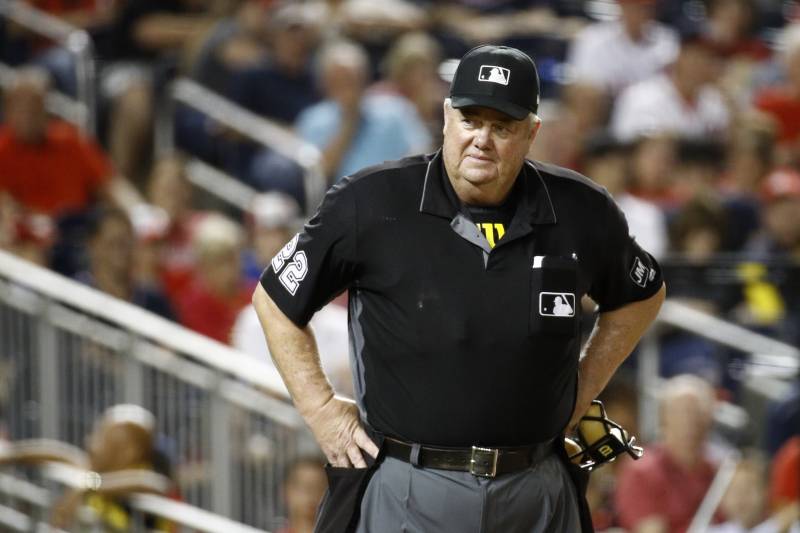


Bleacher Report: MLB Must Embrace Robot Umpires When Baseball Returns BY JACOB SHAFER APRIL 19, 2020 Recently, MLB and the players union considered a plan to bring baseball back as early as May amid the ongoing COVID-19 pandemic. The plan—which reportedly included such tweaks as playing all games in Arizona, having players sit six feet apart in the empty stands instead of the dugout and banning mound visits—is questionable at best. But it features at least one alteration MLB should permanently embrace when games eventually resume: the robot umpire. Or, more accurately, the automated strike zone. In 2019, the independent Atlantic League implemented TrackMan technology, which analyzes pitches via a three-dimensional radar mounted above home plate and feeds ball and strike calls to a flesh-and-blood ump via an earpiece. There were some glitches, as CBS Sports' Katherine Acquavella reported in August. But mostly, she noted, the system "ran seamlessly." "As I've had the opportunity to do it now, it's great," Fred DeJesus, the first Atlantic League ump to use the TrackMan technology in-game, told Acquavella. "It's a great opportunity and it's good for the game. I can see it down the line getting to the next level." MLB also tried out an automated zone in the 2019 Arizona Fall League. In November, Commissioner Rob Manfred told MLB Network the tech would be utilized in some minor league games in 2020. Major league umpires have a tough gig. They're asked to judge a spinning projectile that sometimes travels in excess of 100 mph and make a judgement in real time. They might be the best human beings for the job, but they're wrong...a lot. According to an April 2019 study by Boston University that analyzed pitch data from Baseball Savant, MLB.com and Retrosheet, MLB umps miss about one-fifth of ball and strike calls, a whopping 20 percent. If you require visual evidence, behold: https://www.youtube.com/watch?time_continue=2&v=cKPSnWuI-Xs&feature=emb_logo As the BU study noted, "Given how MLB is heavily dependent on performance statistics when evaluating players, it is surprising the league has been sluggish to apply similar rigor to umpire hiring, promotion, and retention." Grading umpires on their performance makes sense, but why not eliminate human error altogether? It's not a brand-new notion. In 2016, former big league outfielder Eric Byrnes gave it a spin in conjunction with the San Rafael Pacifics, an independent club from San Rafael, California. Byrnes squatted behind the dish in full umpire gear and made calls via an earpiece, much like the Atlantic League experiment. "I'm trying to give the home plate umpires the same information that millions of people at home have access to and can see in real time," Byrnes told me at the time. "Unfortunately, the home plate umpire, the person who's responsible for making the call, doesn't have that information. And that's wrong." Traditionalists will push back. Here's their general argument, summed up by veteran catcher Chris Iannetta (via USA Today's Gabe Lacques): "It doesn't matter if the tech is [100 percent] right or not. It's not baseball. We're not playing a video game; we're playing an actual game, there's men on the field playing, umpires, and that's how it should be." To be clear: No one is proposing getting rid of the players on the field, or even eliminating umpires. There would still be a guy in blue, black and gray indicating balls and strikes, brushing off the dish with his tiny broom, etc. There would still be umps making calls in the field and on the bases (with the help of instant replay). The only noticeable difference would be a less capricious, more consistent strike zone. Baseball has implemented a number of changes and innovations over the years. This is the next logical step. MLB's current collective bargaining agreement expires in 2021. That could be an opportunity for a number of rule changes, including an automated zone. More likely, it'll come several years down the road as the tech is refined and skeptics are won over. When it does arrive (and this feels like a "when, not if" situation), it'll be a net positive for the sport. "Baseball players used to leave their gloves on the field between innings," Byrnes told me. "They used to take trains across the country instead of airplanes. They used to not have lights and not play night games." Progress, in other words, is as necessary as it is unavoidable. Sorry, purists: It's time to embrace the robots. https://bleacherreport.com/articles/2886407-mlb-must-embrace-robot-umpires-when-baseball-returns |
Browse by Month »
August 2023 December 2022 May 2022 December 2021 November 2021 October 2021 September 2021 August 2021 June 2021 April 2021 March 2021 February 2021 November 2020 October 2020 June 2020 May 2020 April 2020 March 2020 February 2020 January 2020 December 2019 November 2019 September 2019 August 2019 July 2019 June 2019 April 2019 March 2019 February 2019 December 2018 July 2018 June 2018 May 2018 April 2018 March 2018 February 2018 October 2017 September 2017 August 2017 July 2017 June 2017 April 2017 January 2017 October 2016 September 2016 July 2016 June 2016 May 2016 April 2016 March 2016 February 2016 September 2015 August 2015 July 2015 June 2015 |